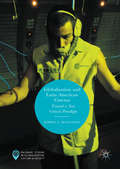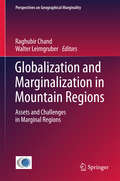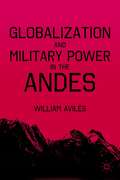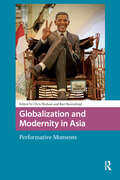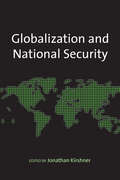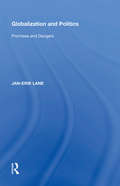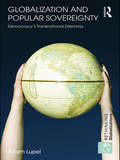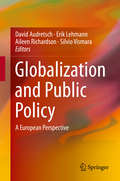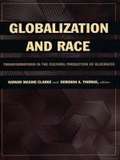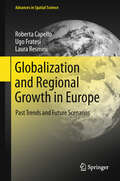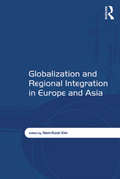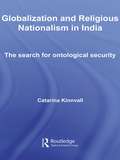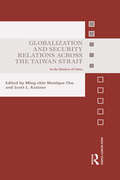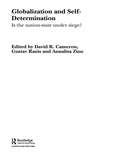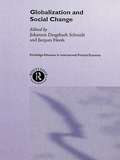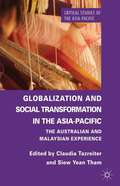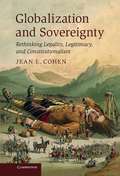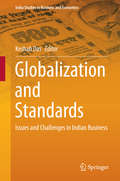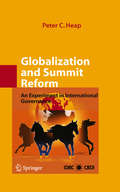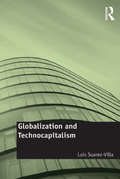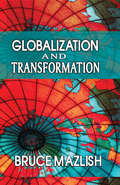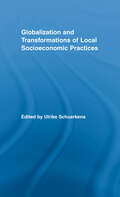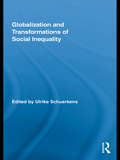- Table View
- List View
Globalization and Latin American Cinema: Towards A New Critical Paradigm (Palgrave Studies in Globalization, Culture and Society)
by Sophia A. McClennenStudying the case of Latin American cinema, this book analyzes one of the most public - and most exportable- forms of postcolonial national culture to argue that millennial era globalization demands entirely new frameworks for thinking about the relationship between politics, culture, and economic policies. Concerns that globalization would bring the downfall of national culture were common in the 1990s as economies across the globe began implementing neoliberal, free market policies and abolishing state protections for culture industries. Simultaneously, new technologies and the increased mobility of people and information caused others to see globalization as an era of heightened connectivity and progressive contact. Twenty-five years later, we are now able to examine the actual impact of globalization on local and regional cultures, especially those of postcolonial societies. Tracing the full life-cycle of films and studying blockbusters like City of God, Motorcycle Diaries, and Children of Men this book argues that neoliberal globalization has created a highly ambivalent space for cultural expression, one willing to market against itself as long as the stories sell. The result is an innovative and ground-breaking text suited to scholars interested in globalization studies, Latin-American studies and film studies.
Globalization and Marginalization in Mountain Regions
by Raghubir Chand Walter LeimgruberThis book looks at the global importance of mountain systems, emphasizing their ecological and socio-economic role in light of climate change and globalization. With a special focus on the Himalayas, it also examines the Czech-German-Austrian mountain borderland, the Alps, the Andes, the highland regions of Malaysia, and the Arctic. The contributors, specialists in their fields, all use an integrative approach that develops and argues the concept of mountain regions as a global common good. Readers also discover that mountain systems and mountain communities are often marginalized and left behind by the process of globalization. Case studies throughout detail the effects of climate change and global warming on both nature and local/regional societies, such as declining water supplies, a shifting vegetation line, and other important issues facing not only mountains but also the vast regions depending on them. In addition, the comprehensive coverage offers authenticated viewpoints from some of the most eminent explorers of Tibet in the nineteenth century. More than 50 percent of the global human population draws benefits directly or indirectly from mountain resources and services. This book provides practitioners, researchers, students, and other interested readers with a compelling look at the global importance of this imposing, yet sensitive ecosystem.
Globalization and Mass Politics
by Timothy HellwigThis book analyzes how increases in international trade, finance, and production have altered voter decisions, political party positions, and the types of public issues that parties focus on in postindustrial democracies. Although many studies interrogate whether internationalization matters in regard to policy outcomes and how globalization relates to mass protest, few examine globalization and mass politics more generally. This book argues that by reducing the room in which to maneuver in policy making, globalization reduces the importance of economic-based issues while increasing the electoral importance of non-economic issues. The argument is tested on original and existing data sources.
Globalization and Military Power in the Andes
by William AvilésThrough a series of comparative case studies, the author demonstrates that the conflicts and struggles over capitalist globalization in the Andes are intricately connected to the political power of the military in the region.
Globalization and Modernity in Asia: Performative Moments (Asian Visual Cultures)
by Chris Hudson Bart BarendregtMuch has been said regarding the global flows of information that are characteristic of modernity; it has been frequently stressed that these conduits are so deeply embedded that local or national environments may be imagined as having a global span. Thus, while we are now well aware that the imagination is integral to global cultural processes, questions still arise about how the imagination of life with a global span is made possible at the level of everyday social practices. This book examines performative interventions that can generate a re-imagining of local publics — both spatially grounded and mediatized — and help to renegotiate the connection between the local and the global. After the ‘performative turn’ of the 1960s, it has been understood that shared experience of performance as event or spectacle can transform interpretations of the global and the local and create new meanings, and this book continues in the direction of this important tradition, while also fully expanding on its consequences.
Globalization and National Security
by Jonathan KirshnerIn this book, top scholars of international relations assess the consequences of globalization for national security, identifying three distinct ‘processes’ of globalization - the intensification of economic exchange, the flow of information, and marketization (the expansion of the set of social relations governed by market forces)-exploring how they can affect the capacity and power of states as well as conflict within and among them. Though much has been written on the topics of globalization and national security, there has been relatively little in the way of a systematic examination of the impact that globalization has on a state's national security. These essays deal with how state-less actors, such as terrorists, utilize the benefits of globalization, changing the nature of the security game. Failure to account for the influence of globalization will make it increasingly difficult to understand changes in the balance of power, prospects for war, and strategic choices embraced by states.
Globalization and Networked Societies: Urban Regional Change in Pacific Asia
by Yue-Man YeungGlobalization, along with globalism, continues its unrelenting and accelerating march as it draws more countries, cities, and people closer into interdependent relationships. Globalization and Networked Societies attempts to tease out some of the salient elements of this process, especially as it has affected urban centers in Pacific Asia over the past twenty years.
Globalization and Politics: Promises and Dangers
by Jan-Erik LaneGlobalization and Politics brings together vision and imaginative insight to the analysis of the evolution of inter-state politics to produce a clear, comprehensive and coherent sense of how globalization works and how it might work better. The study looks upon globalization as a distinct set of phenomena - energy, economy, environment and politics - all of which interact. Presenting opportunities for interdependency and governance, globalization offers both dangers and promises which explains why it is equally feared and praised. Globalization is an economic trend with strong spillovers and as such has become a political trend with cultural implications. This volume is an invaluable, highly readable new text for graduate and undergraduate courses. It sets out the key challenges for globalization in the 21st century and looks at the challenges, responses and risks of globalization. It is required reading for analysts, students and professionals who want to understand what's at stake in the globalization debate.
Globalization and Popular Sovereignty: Democracy’s Transnational Dilemma (Rethinking Globalizations Ser. #20)
by Adam LupelThis volume analyzes the impact of globalization on the concept of popular sovereignty and rethinks it for the transnational domain. It explores how popular sovereignty has historically determined the form of democratic citizenship and how democratic citizenship and legitimacy can be conceived in the transnational sphere in the absence of a global sovereign order. By inquiring into the new global context of popular sovereignty, the book seeks to better understand the emerging structures of global governance and their potential for democratic legitimacy. Lupel argues: That the challenges of globalization necessitate a rethinking of the concept of popular sovereignty beyond the domain of the nation-state That such a rethinking reveals a tension between the particularism of democratic legitimacy and the universalism of cosmopolitan politics Critical attention to the constitutive processes of global governance must become an integral part of democratic theory in the context of globalization; and a transnational model of popular sovereignty provides the best resources for this purpose. This book will be of interest to students and scholars of globalization, democratic theory and international relations theory.
Globalization and Public Policy
by Silvio Vismara David Audretsch Erik Lehmann Aileen RichardsonThis volume of selected articles was released in light of the new economic, social and environmental challenges Europe and the United States have been faced with following the end of the Cold War and in the evolving era of globalization. National security, immigration, and the provision of health and other key social services call for a radically different outlook in terms of policy discussions. The contributors of this book focus on seven key policy issues and challenges that currently affect the United States and Europe: income distribution, the gender pay gap, crime and security, unemployment, health care, the demographic question, and environmental regulation. The purpose of this volume is to analyze how public policy within the European context is responding to the challenges posed by this new global era.
Globalization and Race: Transformations in the Cultural Production of Blackness
by Kamari Maxine Clarke Deborah A. ThomasKamari Maxine Clarke and Deborah A. Thomas argue that a firm grasp of globalization requires an understanding of how race has constituted, and been constituted by, global transformations. Focusing attention on race as an analytic category, this state-of-the-art collection of essays explores the changing meanings of blackness in the context of globalization. It illuminates the connections between contemporary global processes of racialization and transnational circulations set in motion by imperialism and slavery; between popular culture and global conceptions of blackness; and between the work of anthropologists, policymakers, religious revivalists, and activists and the solidification and globalization of racial categories.A number of the essays bring to light the formative but not unproblematic influence of African American identity on other populations within the black diaspora. Among these are an examination of the impact of "black America" on racial identity and politics in mid-twentieth-century Liverpool and an inquiry into the distinctive experiences of blacks in Canada. Contributors investigate concepts of race and space in early-twenty-first century Harlem, the experiences of trafficked Nigerian sex workers in Italy, and the persistence of race in the purportedly non-racial language of the "New South Africa." They highlight how blackness is consumed and expressed in Cuban timba music, in West Indian adolescent girls' fascination with Buffy the Vampire Slayer, and in the incorporation of American rap music into black London culture. Connecting race to ethnicity, gender, sexuality, nationality, and religion, these essays reveal how new class economies, ideologies of belonging, and constructions of social difference are emerging from ongoing global transformations.Contributors. Robert L. Adams, Lee D. Baker, Jacqueline Nassy Brown, Tina M. Campt, Kamari Maxine Clarke, Raymond Codrington, Grant Farred, Kesha Fikes, Isar Godreau, Ariana Hernandez-Reguant, Jayne O. Ifekwunigwe, John L. Jackson Jr., Oneka LaBennett, Naomi Pabst, Lena Sawyer, Deborah A. Thomas
Globalization and Regional Growth in Europe
by Laura Resmini Roberta Capello Ugo FratesiAfter a description of the new forms of globalization currently shaping our world, and of their possible spatial effects, the book highlights which European regions have in the past succeeded in taking advantage of globalization trends and identifies the major reasons for their success. The book also offers a prospective analysis utilizing scenarios based on different assumptions of how globalization trends will develop, identifying the regional winners and losers for each scenario. The analysis greatly benefits from a unique database which contains, among others, data on FDI by sector and professions at the regional Nuts-2 level for all 27 EU countries. A time-span of more than 10 years is covered, and scenarios are developed for the future development up to 2020.
Globalization and Regional Integration in Europe and Asia
by Nam-Kook KimThis volume discusses the current trend of globalization and the main characteristics of world order, focusing specifically on the destiny of the nation state, the threat against human rights, and conflicts between unilateral hegemony of the USA and Europe. It examines the contemporary European experience and compares it with Asian reality with a view to implications for the future development of Asia. It also discusses regional integration as a framework for bringing stable peace, exploring detailed principles and specific forms of a regional community in Asia. Contributors from Europe and Asia critically review previous literature on this topic and suggest new theoretical and empirical grounds of regional community in Asia. The book takes the viewpoint of comparative civilization and experiences of European integration to offer meaningful lessons for the future of nation states and the possibility of building regional communities in Asia.
Globalization and Religious Nationalism in India: The Search for Ontological Security (Routledge Advances in International Relations and Global Politics #Vol. 46)
by Catarina KinnvallExploring the effects of globalization in India and the problem of identity formation, this book contributes to the theoretical and empirical debate on identity, globalization, religious nationalism and (in)security. The author puts forward a new approach based on political psychology, to interpret identity construction, which is seen as an individualized process where interactions of the global and the local are intimately implicated. Thereby, this book presents a psychological analysis of how increased insecurity affects individuals’ and groups’ attachments to religious nationalism in an era of globalization. Developing an interesting angle on a recognized issue of concern in the politics of South Asia, and much more broadly in the context of the contemporary world and developing global politics, this is a valuable addition to normative critical social theory and the debate on identity and culture in political science and international relations, appealing to an inter-disciplinary audience.
Globalization and Security Relations across the Taiwan Strait: In the shadow of China (Asian Security Studies)
by Scott L. Kastner Ming-chin Monique ChuThis book presents an interdisciplinary examination of cross-Taiwan Strait relations and the complex dynamics at play in the region. Since the election of Ma Ying-jeou as Taiwan’s president in 2008, the relationship across the Taiwan Strait—long viewed as one of Asia’s most volatile potential flashpoints—has experienced a remarkable détente. Whether the relationship has been truly transformed, however, remains an open question and the Taiwan Strait remains a central regional and global security issue. A return to turbulence in the Taiwan Strait could also add a new dimension of instability in the already tense maritime disputes in the East and South China Seas. While the relationship across the Taiwan Strait remains critically important, it is also changing rapidly, and the chapters in this volume present new thinking to help make sense of complex cross-Strait dynamics. Specifically, these essays explore different security and/or globalization dimensions of China-Taiwan ties as well as the globalization-security linkages that have emerged. As the balance of power in Asia shifts dramatically, several chapters in this volume explore how traditional security forces are evolving. At the same time, there are new dynamics emerging as a consequence of globalization forces, such as the tremendous economic and social integration across the Taiwan Strait, and several chapters in this volume consider some of these new problems. Finally, several chapters consider the often under-researched dynamics associated with the globalization/security interface such as cyber threats, transnational criminal networks and the security spill-over impact of production globalization. This book will of much interest to students of Chinese Politics, Asian Security, globalisation, diplomacy and International Relations.
Globalization and Self-Determination: Is the Nation-State Under Siege? (Routledge Studies in the Modern World Economy #Vol. 58)
by Gustav Ranis David R. Cameron Annalisa ZinnIs the nation state under siege? A common answer is that globalization poses two fundamental threats to state sovereignty. The first concerns the unleashing of centrifugal and centripetal forces - such as increasing market integration and the activities of institutions like the IMF, World Bank, and WTO - that imperil state sovereignty from 'outside' the nation state. The second threat emanates from self-determination movements that jeopardize state sovereignty from 'inside'. Rigorously analyzing popular hypotheses on globalization's effect on state sovereignty from a broad social sciences perspective, the authors use empirical evidence to suggest that globalization's multilevel threats to state sovereignty have been overestimated. In most instances globalization is likely to generate pressure for increased government spending while only one form of market integration - foreign direct investment by multinational enterprises - appears to increase any feeling of economic insecurity. This volume will be invaluable to course instructors at both graduate and undergraduate levels, policy makers and members of the general public who are concerned about the effects of globalization on the nation-state.
Globalization and Social Change: People And Places In A Divided World (Routledge Advances in International Political Economy #Vol. 6)
by Johannes Dragsbaek Schmidt Jacques HershGlobalization and Social Change challenges conventional thinking regarding the inevitability of globalization. Rather than seeing globalization as 'the end station of capitalism', it presents the development of this phenomenon as a disruptive and conflicting process.
Globalization and Social Transformation in the Asia-Pacific: The Australian and Malaysian Experience (Critical Studies of the Asia Pacific Series)
by Claudia Tazreiter Siew Yean ThamGlobalization and Social Transformation in the Asia-Pacific The Australian and Malaysian Experience by Claudia Tazreiter, Siew Yean Tham
Globalization and Sovereignty
by Jean L. CohenSovereignty and the sovereign state are often seen as anachronisms; Globalization and Sovereignty challenges this view. Jean L. Cohen analyzes the new sovereignty regime emergent since the 1990s evidenced by the discourses and practice of human rights, humanitarian intervention, transformative occupation, and the UN targeted sanctions regime that blacklists alleged terrorists. Presenting a systematic theory of sovereignty and its transformation in international law and politics, Cohen argues for the continued importance of sovereign equality. She offers a theory of a dualistic world order comprised of an international society of states, and a global political community in which human rights and global governance institutions affect the law, policies, and political culture of sovereign states. She advocates the constitutionalization of these institutions, within the framework of constitutional pluralism. This book will appeal to students of international political theory and law, political scientists, sociologists, legal historians, and theorists of constitutionalism.
Globalization and Standards
by Keshab DasThe changes following more than two decades of economic reforms and globalization of the Indian economy - at state, corporate sector, and consumer level - raise interesting questions on the ways in which the stakeholders will continue to engage on the world stage, politically, socially and economically. One key feature of global trade over this period has been the growing importance of not only product standards but, importantly, labor, environmental, food safety and social standards. Being essentially a non-tariff barrier,standards have often become critical to market access and essential to sustained competitiveness. This has a clear impact on the manner in which both global and Indian business is conducted now and in the future. It also underlines the need for a new area of enquiry that addresses the following questions: How are the Indian public and private actors - the state, domestic firms, local consumers and society - influencing and being influenced by such standards? Do standards really matter in an overwhelmingly informal production sphere, with consumers deeply segmented on the basis of a highly skewed distribution of income and with the rural population becoming further marginalized? We have limited knowledge about the challenges faced and strategies pursued by these key domestic actors, both public and private. How have they been able to drive these processes and what are their implications for larger concerns with inequalities and the conditions of the poor? How does the omnipresent informality influence compliance, encourage multiple standards and affect the chances of addressing institutional dysfunctionality? What role does regulation play? These are some of the issues dealt with in the book, which has chapters focusing on aspects of specific sectors such as microfinance, pharmaceuticals, automobiles, tea trading, the role of the state and changing consumer influence. We have limited knowledge about the challenges faced and strategies pursued by these key domestic actors, both public and private. How have been they able to drive these processes and what are the consequences of these changes for the Indian economy, other emergent economies and for the rest of the developing world? In particular, what are their implications for the wider Indian society, especially on concerns with informality, inequalities and the conditions of the poor? How does informality in its omnipresent form influence compliance, encourage multiple standards and chances of addressing institutional dysfunctionality? What role does regulation play? These are some of the issues dealt within the book wherein chapters focus on aspects of specific sectors, trading, role of the state and changing influence of the consumer.
Globalization and Summit Reform
by P. Martin G. Smith Peter C. HeapThis account of the 'L-20 project' describes and analyses a 3-year mobilization designed as an alternative to the political deadlocks preventing progress on critical global issues. The book traces the origins and findings of the project, and addresses such hot button issues as global warming, poverty, and war in the developing world. The book features a Foreword by Dr. Gordon Smith, and an Afterword by the Right Honourable Paul Martin, former Prime Minister of Canada.
Globalization and Technocapitalism: The Political Economy of Corporate Power and Technological Domination
by Luis Suarez-VillaGlobalization and Technocapitalism considers the global reach of a new capitalist era, exploring the nature of 'technocapitalism' as grounded in new forms of accumulation, commodification, and corporate organization. As technological creativity, corporate research, and talent flows become more important than ever, this book explores the manner in which globalization acquires new contextual features that will become central to the macro-social dynamics of the twenty-first century. It thus sheds light on the resultant growth in global inequalities and more intrusive forms of global domination that are grounded in emerging sectors, such as nanotechnology, biotechnology and its diverse fields, such as genomics, synthetic bioengineering, bioinformatics and biopharmacology, and related advances in computing and telecommunications. A rigorous examination of developments in contemporary capitalism as driven by the forces of globalization, Globalization and Technocapitalism will be of interest to scholars working in the fields of social and political theory, international political economy, political philosophy, science and technology studies and globalization.
Globalization and Transformation
by Bruce MazlishIn Globalization and Transformation, Bruce Mazlish examines developments in contemporary warfare, economy, technology, and religion as fundamental factors in human experience that have accelerated global change in recent years. Continuing the analysis he began in Reflections on the Modern and the Global, Mazlish delves into human history, examining who we were so as to help us understand who we are today.Early in the volume, Mazlish highlights the British historian Geoffrey Barraclough, who foresaw the trajectory of world events that gave rise to the "New Global History." He also examines humanity's progress, reminding us of contemporary globalization's precursors: the theories of Charles Darwin; the concept of the global and the local coupled with inquiry into the concept of parts and wholes; merchant empires, such as the English and Dutch East India companies that crisscrossed the ocean in pursuit of profits and power; anti-globalization; and the linkage of globalization to the very concept of humanity.Though globalization is a complex concept, and versatile in its applications, Mazlish focuses on its transformational characteristics, noting that globalization's impact is not uniform across society's culture, politics, or economics. Some parts of the world have yet to accept the challenge to their past traditions. These stimulating essays offer new insights into a major phenomenon of our time.
Globalization and Transformations of Local Socioeconomic Practices (Routledge Advances in Sociology)
by Ulrike SchuerkensThis innovative volume provides a comprehensive overview of the transformation of socio-economic practices in the global economy. The contributors offer analytical and comparative insights at the world level, with regard to the current socio-economic practices as well as an assessment of the overall economic globalization phenomenon in the global world. Through empirical case studies of different civilizations or cultures that describe situations of intertwining of local socio-economic practices and global economic modernity, this volume assesses the overall situation in the world, looking at the world as an economic system where some countries act as winners, others as losers and some as both winners and losers of economic globalization. This exceptional book will appeal to sociologists, social and cultural anthropologists, and economists interested in development.
Globalization and Transformations of Social Inequality (Routledge Advances in Sociology)
by Ulrike SchuerkensSocial inequality is a worldwide phenomenon. Globalization has exacerbated and alleviated inequality over the past twenty-five years. This volume offers analytical and comparative insights from current case studies of social inequality in more than ten countries within all the major regions of the world. Contributors provide an assessment of the overall social globalization phenomenon in the global world as well as an outlook of transformations of global social inequality in the future. This book will be a timely addition for students and scholars of globalization studies, social inequality, sociology, and cultural and social anthropology.
